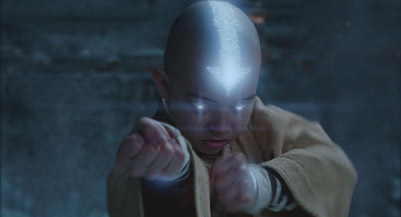Movie Review: The Last Airbender
By Matthew Huntley
July 8, 2010
BoxOfficeProphets.com

I’m afraid the terrible reviews aren’t exaggerated. The Last Airbender is one bad movie. Forget filmmaking; Shyamalan seems to have forgotten the basic fundamentals of storytelling itself. There’s no establishment of a time and place; we don’t know where the characters or locations are in relation to anything else; the screenplay is overloaded with expository dialogue that nobody - real or imaginary - would ever speak; and we are told, via a narrator, just about everything we can see on-screen for ourselves. After The Sixth Sense, Shyamalan might have convinced us he wrote the book on filmmaking and the idea of trusting your audience’s instincts, but if ever there was a movie that went against that principle, Airbender is it.
The movie is based on the well-received Nickelodeon TV series called Avatar: The Last Airbender, and the feature version was supposed to share the same title until a little-known movie called Avatar came long and stole the limelight. Like the show, the movie takes place in a world (it’s never established if it’s Earth, but we assume it is) where certain members of the Four Nations - Air, Water, Earth and Fire - are able to manipulate their respective element. A lone Avatar is destined to maintain peace and harmony between each nation because he is the only one with the ability to bend all four elements. He is their savior.
In this first installment, subtitled Book One: Water, we learn the Avatar is a little boy named Aang (Noah Ringer), who has been frozen in suspended animation for the last 100 years. Born an Airbender and aware of his own destiny, Aang fled his monastery because he feared the responsibility bestowed upon him. He cries that his prestigious position would prevent him from having a family of his own. Here’s my first question: Aang is approximately 10-12-years-old, right? Would a 10-12-year-old really be concerned about not having a family later in life? Do they even think about that kind of stuff?
Anyway, in the time since Aang disappeared, the greedy Fire Lord Ozai (Cliff Curtis) wreaks havoc on the other nations as a means to dominate the world. Okay, second question: how is he able to do this, especially when the other nation-members could simply manipulate their own element and fight back? For instance, on the Earth nation, the Earth people are enslaved by the Fire people. Why don’t the Earthbenders just raise some soil and knock them off the land? Why do they just stand around and take it?
Aang is discovered and unfrozen by a Waterbender named Katara (Nicole Peltz) and her older brother, Sokka (Jackson Rathbone). At the request of their grandmother, they vow to protect Aang and ensure he learns how to manipulate the other four elements so he can fulfill his destiny and restore balance. All the while, Aang is pursued by the Fire Lord’s son, Prince Zuko (Dev Patel), who was exiled from the Fire Kingdom for reasons that aren’t quite clear. The only way the Prince can restore his honor is by capturing the Avatar and appeasing his father.
After researching the TV series, I believe it’s possible this story could make a good feature. Friends of mine have mentioned how good the show was, but apparently that magic and credibility has been lost through Shyamalan’s adaptation. The way Airbender is shot, edited and performed is so bad it’s sort of incredible it got this far. You can start to see problems in the opening scene, when Katara is practicing her manipulation and forms a bubble out of freezing water. She accidentally drops it and we hear a splash. Yet, we don’t see where the bubble lands - the camera just holds on Katara and eventually we see Sokka come into frame with his back to us. Apparently, the bubble landed on him, but he doesn’t look wet. You may have trouble seeing my point, but if you ever see this scene (and I strongly discourage it), you’ll realize just how awkward it plays.
There are several other moments in the movie just like this, in which shots linger too long or there isn’t an appropriate reaction shot or cutaway. For instance, back on the Earth nation, when Aang is explaining his mission to Katara and Sokka, their exchange is filmed only in extreme close-ups and there’s no variance in camera angles or positions. Why is there no master shot or medium shot? The way this movie is pieced together is alarmingly amateurish and illogical.
It’s amazing how Shyamalan, who once displayed a mastery of pacing, tension and atmosphere in The Sixth Sense, seems to have no grasp of those concepts here. In that former film, he also garnered one of the best child performances of recent memory, but in Airbender, the acting is so poor, both from the kids and adults, you wonder if the director has lost his nerve and given up demanding anything deep or convincing from his cast.
With a movie like The Last Airbender, critics could go on and on about how bad it is. But I refrain, for I fear any additional bashing would merely spark readers’ curiosity and inadvertently encourage them to see it just to see how bad it is. So I’m going to stop there and end my review by writing, plainly and simply, that this is just a very bad movie. It’s badly written, directed, shot, edited and acted - the whole nine yards. It’s not ambitiously bad, but bad in the way it makes you wonder how it ever got past the dailies stage. It’s unsettling to think that someone, probably Mr. Shyamalan, believed any of it was ever good enough for theaters. How grossly mistaken he was.